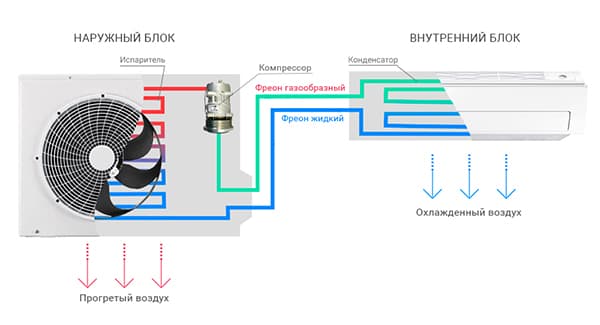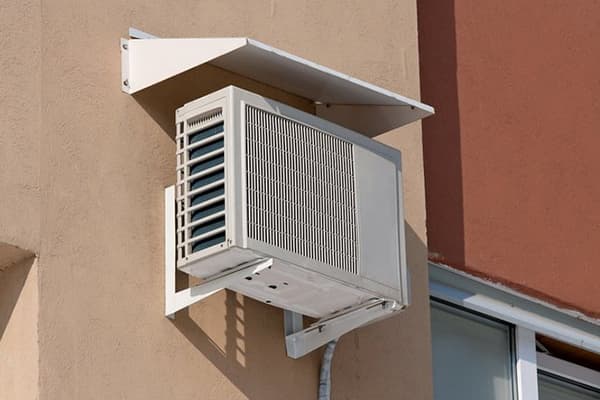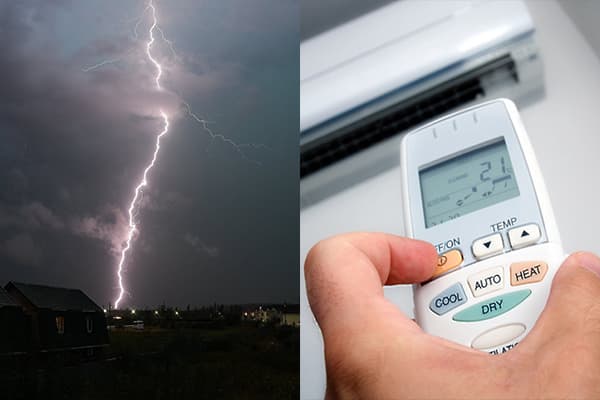Is it possible to turn on the air conditioner during rain and thunderstorms?
Operating household appliances during rain always raises questions, especially if the rain is accompanied by thunderstorms or hail. Experts say that it is possible to turn on the air conditioner in the rain. Precipitation cannot damage the external unit. However, it is worth taking certain measures to prevent thunderstorms or hail from causing the air conditioner to break down.

The principle of operation of split systems
To understand how rain and other types of precipitation affect modern climate control technology, it is necessary to understand the operating principle of air conditioners. Most modern systems consist of two blocks. One of them is installed outdoors, the second - indoors.
Each block performs its functions:
- The module placed indoors consists of a heat exchange unit and fans. Fans drive warm air from the room to the exchange unit. There, the air gives off heat to freon and returns to the room.
- The outdoor module also contains a heat exchanger. In addition, under the housing there is a compressor that drives freon between two circuits, and a fan. Hot freon enters the heat exchange unit and transfers heat to the street air. The fan expels portions of heated air, replacing them with cooler air. Thanks to heat exchange, the freon gradually cools down and then returns to the indoor unit.
In addition to the described schemes, there are also more complex options that involve the use of street air to “ventilate” the room.However, in this article we will consider only the classical scheme.
It is the street block that is exposed to atmospheric influences. Manufacturers take into account the likelihood that this module will be exposed to rain, so they place it in a stainless steel case, protected from rainwater getting inside. Therefore, operating the air conditioner in the rain does not pose any risk to either the equipment or its users.
Specifics of the operation of the air conditioner in the rain
As a rule, rainy weather is characterized by a decrease in atmospheric temperature. This makes the operation of the air conditioner easier, as heat exchange in the external circuit is accelerated. Cold outside air removes heat from freon faster and creates less load on the compressor. In addition, the room temperature decreases naturally, which also reduces the operating time of the air conditioner.
The second factor that can affect the operation of the air conditioner during rain is air humidity and water droplets. Theoretically, there is a possibility that drops of water will get inside the casing of the external unit. However, most manufacturers guarantee the security of the housings of external modules of their climate control systems at the IPX4 level.
Protection class “IPX4” means that the device body is protected from splashes of water flying in any direction. This means that even heavy rain combined with a stormy wind is not able to throw water inside the housing of the external unit of the air conditioner.
Although the external unit of the climate system is protected from moisture, it is not able to protect the device from the impact of hailstones or icicles falling from the roof. Therefore, when installing climate control equipment, you should take care in advance of constructing a canopy over the device.
Most modern air conditioner models are equipped with air drying units. They are able to reduce the humidity in the room, making the atmosphere in the room more comfortable for the people in it. Therefore, using an air conditioner in the rain is not only safe, but also useful.
Safe use during thunderstorms
A thunderstorm is rain accompanied by lightning strikes and thunderclaps. Atmospheric electricity can be dangerous not only for air conditioners, but also for other electrical appliances installed in the house. If lightning strikes your home, it can damage any electrical devices that are turned on at that time.
Most modern buildings are equipped with a lightning rod system and grounding of outlets. All these protective systems significantly reduce the risk of electrical appliances being damaged by lightning. The probability of such a strike is very small, but it is impossible to reduce it to zero. Therefore, during a thunderstorm, it is advisable to turn off electrical appliances, including the air conditioner.
Electrical safety experts do not recommend turning the air conditioner on and off when lightning is already flashing outside the window. The fact is that the device is most likely to be struck by lightning at the moment the current begins to flow or the power is turned off. It is better to turn off the air conditioner in advance when the thunderstorm is just beginning.
By following the recommendations outlined, you can operate the air conditioner during rain without worrying about your own safety or the risk to the device.

